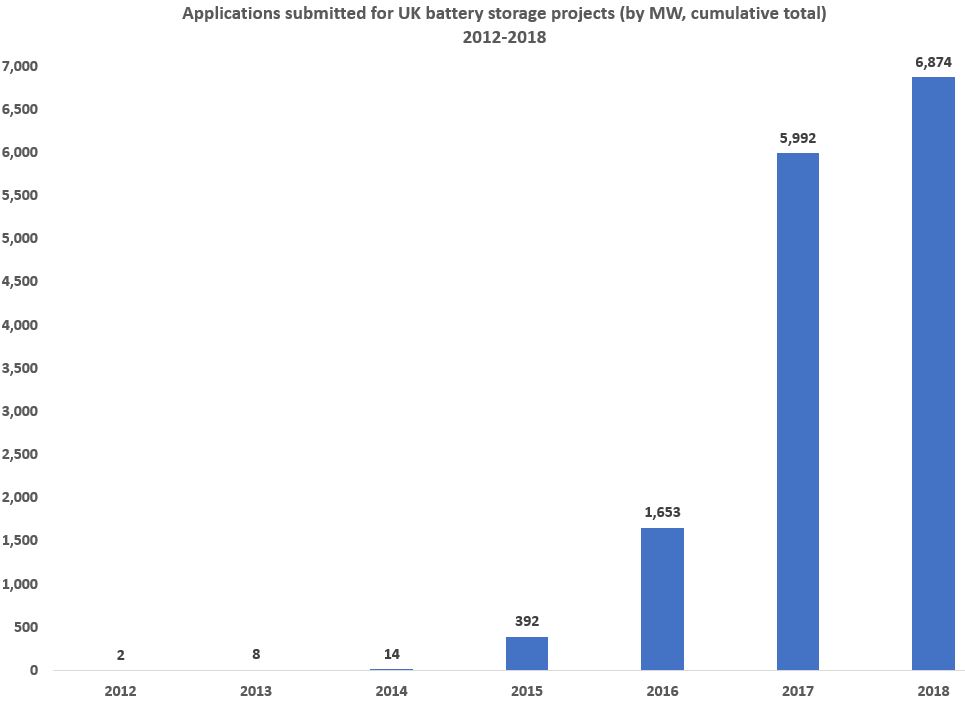UK-based renewable energy association, renewableUK has launched a new database, interactively mapping the UK's storage capacity. At an energy storage event in London, the association presented its new tool which lets its members of the industry access the comprehensive list of battery storage projects in the UK.
According to the announcement the database, shows storage projects in their operational phases, but also lets the user discover which projects are currently under various stages of planning. Looking at the provided data shows a strong uptake in planning applications for battery storage capacity in 2018 compared to 2012.
Accordingly, the UK has seen just 2 MW of storage planning application in 2012, but since then applications have soared to reach a cumulative 6,874 MW in 2018. Bearing in mind that 92% of all storage applications are granted in the UK, this marks a significant uptake. By the associations account it would enough to power nearly half a million EVs.
“The energy sector is breaking new ground by making an unprecedented transition to a clean, flexible system which will power our country in the future.” SaidRenewableUK’s Executive Director Emma Pinchbeck. “Energy storage is already playing a key part in that, from small local projects to grid-scale schemes. We’re decentralizing the way the power system works and, at our conference, we’ll hear how an increased share of wind, solar and storage on the grid could transform UK energy markets”.
In the announcement, the company says that the average size of grid-scale storage projects had increased from 10MW in 2016 to 27MW today. Moreover, 3.3GW of storage capacity (including pumped hydro projects) is now operational in the UK and a further 5.4.GW has planning consent – including 4.8GW of battery storage, which is enough capacity to charge 480,000 electric vehicles fully.
For example, Eelpower, an independent U.K. provider of flexible energy services, has announced ambitious plans. Having just acquired the 20 MW Rock Farm battery storage scheme from Anesco, it has said it would deploy 1 GW of storage by 2022.
By 2022, Eelpower intends to invest around £500 million in the deployment of the 1 GW of storage. The company is funded by Gravis Capital Management – in April, the two signed a debt funding agreement worth £20 million – and other, private investors.
In January 2018, new government funding totaling £42 million ($58.5 million) was announced for the Faraday Institution, to support further battery storage research.
The monies are part of a wider £246 million Industrial Strategy intended to boost the U.K.’s battery know-how and scale-up capabilities. Four U.K.-based consortia will receive funding to support their application-inspired research aimed specifically at overcoming current challenges in acceleration of the electric vehicle (EV) industry.
“Energy storage has already begun to unlock the full potential of wind and solar energy, and it’s happening faster than almost anyone anticipated. It’s clear that storage will be the foundation of a smart, flexible and decarbonized future energy system” The Chief Executive of the Solar Trade Association Chris Hewett said.
This content is protected by copyright and may not be reused. If you want to cooperate with us and would like to reuse some of our content, please contact: editors@pv-magazine.com.




2 comments
By submitting this form you agree to pv magazine using your data for the purposes of publishing your comment.
Your personal data will only be disclosed or otherwise transmitted to third parties for the purposes of spam filtering or if this is necessary for technical maintenance of the website. Any other transfer to third parties will not take place unless this is justified on the basis of applicable data protection regulations or if pv magazine is legally obliged to do so.
You may revoke this consent at any time with effect for the future, in which case your personal data will be deleted immediately. Otherwise, your data will be deleted if pv magazine has processed your request or the purpose of data storage is fulfilled.
Further information on data privacy can be found in our Data Protection Policy.